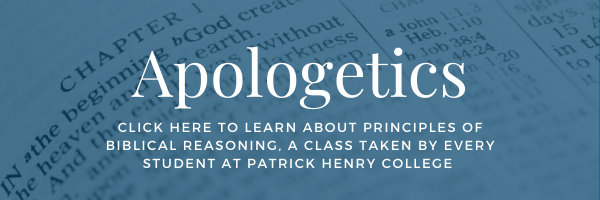.gif?width=600&name=Why%20PHC%20has%20one%20of%20the%20largest%20cores%20in%20the%20nation1%20(3).gif)
The Big Picture: Huge Classical Core Curriculum at Patrick Henry College
Patrick Henry College wants its students to get a look at the big picture in their education. So many different areas of study blend into each other that studying one discipline apart from its context or relationship to other disciplines could limit the scope and understanding of that one subject. History, for instance, becomes rather hollow without understanding at least a little bit of philosophy. And in contrast, philosophy’s impact today goes unstated without looking at how it has impacted the thinking of people in the past.
This is why we need a liberal arts education. But even among liberal arts colleges, PHC's core is huge!
In an attempt to create a more holistic understanding of the sciences and arts, every student at Patrick Henry College takes a common number of classes. To be exact, there are 63 credit hours required in PHC's "core curriculum," likely the most of any liberal arts college. To go one step further, it is a carefully prescribed set of courses. Rather than picking and choosing from a menu, every student takes every course in the core curriculum.
According to Dr. Michael Poliakoff, President of The American Council of Trustees and Alumni, having a core curriculum used to be a regular part of the college experience, but has now grown scarce. This, says Dr. Poliakoff, has led to less-prepared graduates as students continue to study increasingly narrower fields of interest.
"Today, only 32% of campuses require students seeking a B.A. or B.S. degree to complete a course in literature, and merely 12% require students to demonstrate intermediate-level proficiency in a foreign language," according to ACTA research.
"Only 58% of schools require a collegiate-level mathematics course, which means that graduates from hundreds of universities are joining the workforce ill-prepared to learn new quantitative analysis skills in our fast-changing knowledge economy."
To address this problem, students at Patrick Henry College are required to complete a 63-credit classical liberal arts core curriculum. Obviously, there’s no way to teach students an exhaustive list of disciplines, but this core is designed to equip graduates for lifelong learning—to teach students how to think, how to learn, and how to draw connections between various academic disciplines. Regardless of what field of work a Patrick Henry College graduate chooses, they carry with them a glimpse of a bigger picture that will help them excel wherever they might be.
The Results
Patrick Henry College students have been hired by the White House, have been selected to clerk at the Supreme Court, have signed contracts with CNN, Fox News, and many similar platforms. Now while a part of that success has been the result of the hard work of students, the faculty at Patrick Henry College believe that this is also due to the solid foundation built by the core curriculum.
But what’s unique about PHC's specific core?
The liberal arts have historically centered human existence around faith, and education is viewed as a tool to deeply understand this divinely ordered world and man’s purpose in it. Patrick Henry College’s classical liberal arts core curriculum gives students more than an impressive academic arsenal, it gives them a conceptual framework to expand their perspective on God, themselves, and everything beyond. The core helps students at Patrick Henry College understand the world as divinely created, unified, and possessing intrinsic purpose and worth.
Patrick Henry College’s core curriculum gives students exposure to all seven classical liberal arts subjects.
- United States History I & II
- History of Western Civilization I & II
- Freedom’s Foundations I & II
- Music History & Appreciation
- Theology I & II
- Philosophy
- Logic
- Economics for the Citizen
- Constitutional Law
- Geometry
- Physics
- Physics Lab
- Biology and Biology Lab
Really, there are a myriad of lessons that students at Patrick Henry College can take away from these classes, but three, in particular, stand out.
Faith & Reason
First, God’s created order is revealed in all elements of reality. The diverse core classes point back to a divine order in all things. The core is structured to show students how all of reality is connected, through subjects like science, logic, history, and philosophy. These classes aid a student's understanding of how the world actually is—the world as God sees it. Likewise, only the kind of learning that is done in submission to a knowledge of God's revealed Truth allows students to see mankind as we truly are—as God sees us.
Each new course builds on the last, ever revealing new doors to the world that point back to the same Truth. This Truth is that there is something beyond us—a divine Creator—and we are made to submit to His order and live for His glory. Whether it be mathematics, logical principles reflecting God’s ordered universe, philosophy, or social questions throughout history that reflect man’s longing for the infinite, each of these classes connects and points back to God’s Truth and order. The Christian faith integrates with everything we do, and students will discover this truth for themselves in the core curriculum.
A Doorway to Growth
Second, the core curriculum provides students a common foundation with which they can delve deeper into their major. By knowing God to be the center of reality, students learn how their specific interests are informed by that Truth. Professors can take their students deeper into their vocational training because they know what principles and information the students have been taught. Again, the core at Patrick Henry College doesn’t aim to cover every subject imaginable. What it does do is prepare students to better understand any intellectual inquiry as it introduces students to subject matter that lies outside of their particular major—knowledge that they would not otherwise be familiar with in a narrower academic program.
Because of Patrick Henry College’s dedication to academic rigor, graduates have been trained to learn, to think, and to better solve problems. Students are encouraged to think for themselves and to always strive for excellence. On the whole, the curriculum at Patrick Henry College produces well-rounded students, capable of operating within and outside of their area of expertise.
Living Excellently
Third, this curriculum develops thinking habits that foster deep interactions beyond the classroom. Students are shaped into critical thinkers and are equipped for more than just academic excellence and professionalism. They have the tools to live with a biblical and rich, classical perspective about themselves and society. After training in philosophy and then political philosophy, students come away knowing how to persuasively argue their beliefs, convictions, and ideas. These are tough subjects. Many of them push students to their limits and encourage them to think seriously about the world around them. Not only will these classes enable students to think hard, but also reflectively. The liberal arts create habits of thinking skills applicable not only to school but also in the personal and everyday life of a student. There is value to self-evaluation and introspection.
The core curriculum is an education for freedom. The soul that longs for and is fulfilled by its Creator is free indeed.
-------
Interested in learning about Patrick Henry College and our method of education, click below to meet a member of the admissions staff. PHC staff would be more than happy to put you in contact with a current student who can better answer what learning is like at PHC!





